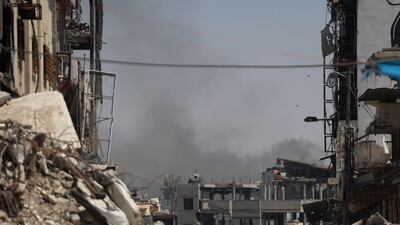Live updates: Follow the latest news on Israel-Gaza
The Israeli army has continued ground operations and raids on the Shujayea neighbourhood east of Gaza city in the northern Gaza Strip, while its warplanes attacked Tal Al Sultan, west of the southern city of Rafah.
Shells fell on Shujayea and around Barcelona Park in Tel Al Hawa, south-west of Gaza city.
The neighbourhood became infamous to Israeli forces during fierce fighting there in the 2014 Gaza war, and has been the scene of a bloody, four-day operation.
As with fighting in Rafah, where Israeli forces have battled since early May, the ongoing intensity of violence has raised questions over whether Israel has a post-war plan for the enclave, which is now almost totally destroyed.
Israeli Prime Minister Benjamin Netanyahu on Sunday hinted there was little plan for post-war governance in the strip in a cabinet meeting on Sunday.
He said his government was "committed to fighting until we achieve all of our objectives: Eliminating Hamas, returning all of our hostages, ensuring that Gaza never again constitutes a threat to Israel and returning our residents securely to their homes in the south and the north," he added.
The commitment to "eliminate Hamas," is an implicit rejection of truce talks, mediated by the US, Egypt and Qatar, because the group has insisted on maintaining a central role in Gaza in the event of a lasting ceasefire.

In Rafah, heavy artillery shelling and gunfire was reported in the Al Mawasi area, west of the city, which the Israeli army had described as a safe zone.
According to medical sources, six Palestinians were killed in the shelling of the Israeli warplanes at the home of the Zaarab family, west of Rafah.
Attacks on Shujayea began on Thursday, with orders to Palestinians to evacuate the area and head to a designated “humanitarian zone” in the south.
Avichay Adraee, the Israeli army's Arabic-language spokesman, posted a list of the zones that were to be evacuated on X.
Ramy Abdu, director of the Euro-Med Human Rights Monitor, said that the group’s field team confirmed dozens of deaths in the raids.
“Israel is committing widespread massacres in the northern part of the [Shujayea] neighbourhood and the Jdaida area. Our field team is receiving reports of dozens, possibly hundreds, of victims being executed on the spot or having their shelters bombed,” he wrote on X.
The Israeli military on Saturday announced the death of two soldiers in combat in northern Gaza, as their forces pressed on with their offensive in Shujayea.
Residents said tanks advanced into several districts, including the area around the local market and there was heavy fire from the air and the ground.
Meanwhile, the Israeli military said it plans on remaining in Gaza “as long as no other international entity is found” and that the war could last many more months, an Israeli security source told Israel's Kan public broadcaster.
According to the source, the chance of reaching an agreement with Hamas without ending the war is “very low”.

A senior official of Hamas, Osama Hamdan, on Saturday said there has been no progress in ceasefire talks with Israel over the Gaza war.
The Palestinian group is still ready to “deal positively” with any ceasefire proposal that ends the war, Mr Hamdan told a news conference in Beirut.
Arab mediators' efforts, backed by the US, have so far failed to conclude a ceasefire, with each side blaming the other for the impasse. Hamas said any deal must end the war and bring full Israeli withdrawal from Gaza, while Israel said it will accept only temporary pauses in fighting until Hamas, which has ruled Gaza since 2007, is eradicated.
Mr Hamdan also blamed the US for applying pressure on Hamas to accept Israel's conditions.
“Once again, Hamas is ready to deal positively with any proposal that secures a permanent ceasefire, a comprehensive withdrawal from Gaza Strip and a serious swap deal,” said Mr Hamdan, referring to a possible swap of hostages held in Gaza for Palestinians in Israeli prisons.
The war started with Hamas's October 7 attack on southern Israel which resulted in the deaths of 1,200 people, mostly civilians, according to an AFP tally based on Israeli figures.
The militants also seized hostages, 116 of whom remain in Gaza although the army said 42 are dead.
Israel's retaliatory offensive has killed at least 37,834 people, also mostly civilians, according to data from the Gaza Health Ministry.


